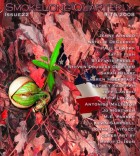Cats and birds. Both work so well, both literally and figuratively, in “How Anything Got Done.” What do cats and birds symbolize? What do you, almost without thinking, think of when you see a cat and bird, besides, of course, Sylvester and Tweety?
We tend to think of cats and birds together as predators and prey (as in the Sylvester and Tweety notion), but there’s something so predatory about both animals. In the eye of a garden sparrow, there’s a ruthless determination to survive that I think is more removed from us than a cat’s languid cruelty. I wanted to connect this notion with dinosaurs in the story, in a passing touch on proto-birds as predators, alongside images of birds as prey like the crippled bird on the porch and the broken eggshells on the counter. I wanted this notion of a world of predators and prey, of brutal realities attending life on Earth as long-standing conditions, and our reactions to such things.
And come to think of it, Tweety can really handle himself.
“It’s broken.” That line carries a lot of weight (at least for me it does) in this piece. What might be some things, along with the bird, that the “it” refers to?
For me, it’s not anything as simple as Jim and Anne having troubles in their marriage, or Jim feeling frustration at being a dad. I think that the story is throughout a combination of cozy, domestic elements and an ominous sense pressing in from outside—the blustery wind, the cat with the dying bird. I think it’s not so much about specific things being broken but about maintaining in a life where things are always breaking.
How would you answer Jim’s question, “How do you think anything ever got done in this world?”
This takes us back to the whole notion of a world with harsh realities, connecting with axioms like, “You can’t make an omelet without breaking a few eggs.” It is rooted in realizations about life consuming life to survive, of an existence in which someone wins because someone loses. All of this sounds so pat, stated this way: It’s a tough old world, life is hard, etc., etc. I think if you chop the short epilogue off the end of the story, the moment of Jim sitting in bed and feeling an almost transcendant fear of how fragile we are in the world, what you would have left is a story that is too satisfied with itself and its conclusions, a story that dreams of somehow floating above this world of fragile mortality and harsh stakes. Jim isn’t an unfeeling brute, he’d just like to finish dinner for his family.
So to answer your question, I would respond to Jim’s question with a question, like any infuriating psychoanalyst: “Is that a realization or a rationalization?” And for me, the answer is that it’s a bit of both.
“The sublime joy of absolute unflinching purpose.” When do/did you feel such a thing? Describe it for us, if you’d be so kind.
I’ve never felt the kind of pure instinct without doubt that I’m writing about here, or if I have, I can’t consciously access it. I think that the complications and doubt that intercede on such sheer purpose is humanity’s only hope. Or maybe that’s a neurotic’s rationalization. I think there’s an envy for such a feeling, to become a whole being in purpose, whatever the goal. It’s there in Jim’s desire to fulfill his responsibilities without faltering. But I think scary things come from this desire for such single-minded purpose that rejects doubt, and that we see it played out in fundamentalist thinking of all kinds.
Begin this answer with the words, “I write.” Complete the sentence. Then, write as many sentences as you’d like, each one beginning with that “I write….”
I write to be most myself. I write because narrative makes more sense to me than just about anything else. I write because if there’s beauty in me, it’s in the writing.



 The core workshop of SmokeLong Fitness is all in writing, so you can take part from anywhere at anytime. We are excited about creating a supportive, consistent and structured environment for flash writers to work on their craft in a community. We are thrilled and proud to say that our workshop participants have won, placed, or been listed in every major flash competition. Community works.
The core workshop of SmokeLong Fitness is all in writing, so you can take part from anywhere at anytime. We are excited about creating a supportive, consistent and structured environment for flash writers to work on their craft in a community. We are thrilled and proud to say that our workshop participants have won, placed, or been listed in every major flash competition. Community works.